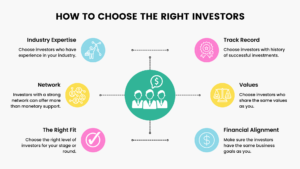
Capital is the lifeblood of business. Without capital, you cannot fund your daily operations and grow your business. Finding investors does not have to be difficult. However, given the recent volatility and market correction, entrepreneurs need to recalibrate their expectations for the challenges ahead.
While there remains a healthy ecosystem of angel investors, venture capitalists, family offices, strategic corporates and investor clubs, ready to put their money where the inspiration is, companies will have to be prepared for more rigorous due diligence, measured expectations around valuation, and the mental fortitude to survive with potential fewer resources. How do we identify the right investor to invite onto our cap table? The right investor will not only provide funding but will also offer insight and expertise to help grow the business. When thinking about which investors you want for your business venture, there are a few things you should be mindful of.
Choosing the right investors for your business

